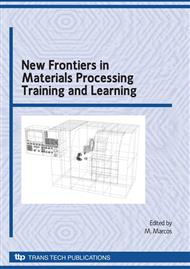p.43
p.51
p.61
p.67
p.77
p.83
p.95
p.105
p.113
The Application of PDAs and Smartphones in the Classroom as Instruments for Improvement of Learning Monitoring
Abstract:
The skill of students in the use of new technologies could provoke serious problems of lower attention toward studied contents in the classroom. Nevertheless, many advantages can be also highlighted from an educational point of view: high ability for the search of technical information, quicker exchange of information by keyboard interface, good communication resources for group works, etc. In this sense, the quality of teaching action can be remarkably improved by the application of educational platforms based on electronic devices such as PDA and Smartphones, as proved by the project of educative innovation that was carried out by the authors of this work. With the purpose of promoting the philosophy of continuous improvement into the teaching/learning process, these authors created a platform dedicated to facilitate the interactive communication between teacher and students inside the classroom, as a useful educative tool to provide a feedback about learning level achieved by students. The new technology is oriented to assist to the teacher by means of introduction of the Shewhart Cycle –or also named PDCA (Plan, Do, Check, Act) Cycle–, avoiding the waste of sheet and significant time losses during the educative practice. The results obtained regarding the course “Quality Engineering” that belongs to degree of Industrial Engineering are shown in this work, although similar benefits could be achieved for other courses contained in technical teachings.
Info:
Periodical:
Pages:
113-121
DOI:
Citation:
Online since:
August 2009
Keywords:
Price:
Сopyright:
© 2009 Trans Tech Publications Ltd. All Rights Reserved
Share:
Citation:


